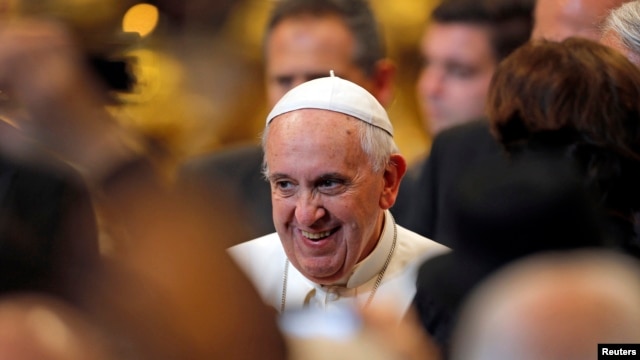Cuba Deal Is Major Victory for Pope
Pope Francis smiles as he leaves after an audience with Italian athletes in St. Peter's Basilica at the Vatican, Dec.19, 2014.
December 19, 2014 3:14 PM
A flash mob on St. Peter’s Square danced the tango earlier this week to honor Argentine Pope Francis on his 78th birthday. The biggest present, however, may be the one he gave — the secret mediation of renewed diplomatic ties between the United States and Cuba, which was made public on Wednesday.
"Today we are all happy because we have seen two countries, which had moved away from each other for many years, take a step closer yesterday," Francis said the following day in his first public comments on a rapprochement that took 18 months to hash out.
The pope’s role was hailed throughout the U.S. and Latin America, but in Miami’s Little Havana neighborhood, Cuban-American Catholics had mixed feelings.
“He did a tremendous job,” said Luis Shiling.
“What others have been unable to do for so many years, the pope achieved it,” said Alexis Sanchez.
Raymond Molina, who was a Cuban Supreme Court judge before the revolution, doesn’t like what he sees.
“The Vatican has been used by the Castro regime, and the Castro intelligence,” he said, alleging that Catholic clergy in Cuba “have been bought and intimidated and subjected to the pressures of the Castro regime.”
Popes have been involved in Latin American geopolitics ever since Alexander VI drew a line down a map in the 1494 Treaty of Tordesillas, dividing up the new colonies between Spain and Portugal.
The current pope has engaged in a number of diplomatic initiatives. He has invited Israeli and Palestinian leaders to pray with him. He led a global prayer vigil for peace in Syria. And he has offered to help the United States find a way to close Guantanamo prison.
The U.S.-Cuba deal will not only reconnect two countries that have been at odds for more than half a century, but also help the pope’s overall effort to reform the Church, says Andrew Chesnut, a Catholic studies scholar at Virginia Commonwealth University.
The U.S.-Cuba deal will not only reconnect two countries that have been at odds for more than half a century, but also help the pope’s overall effort to reform the Church, says Andrew Chesnut, a Catholic studies scholar at Virginia Commonwealth University.
“Some of the more vocal and strident opponents of his reformist agenda have been certain American bishops,” he said. “And I think this kind of not universally but very popular diplomatic victory puts him in a stronger position.”VOA



No comments:
Post a Comment